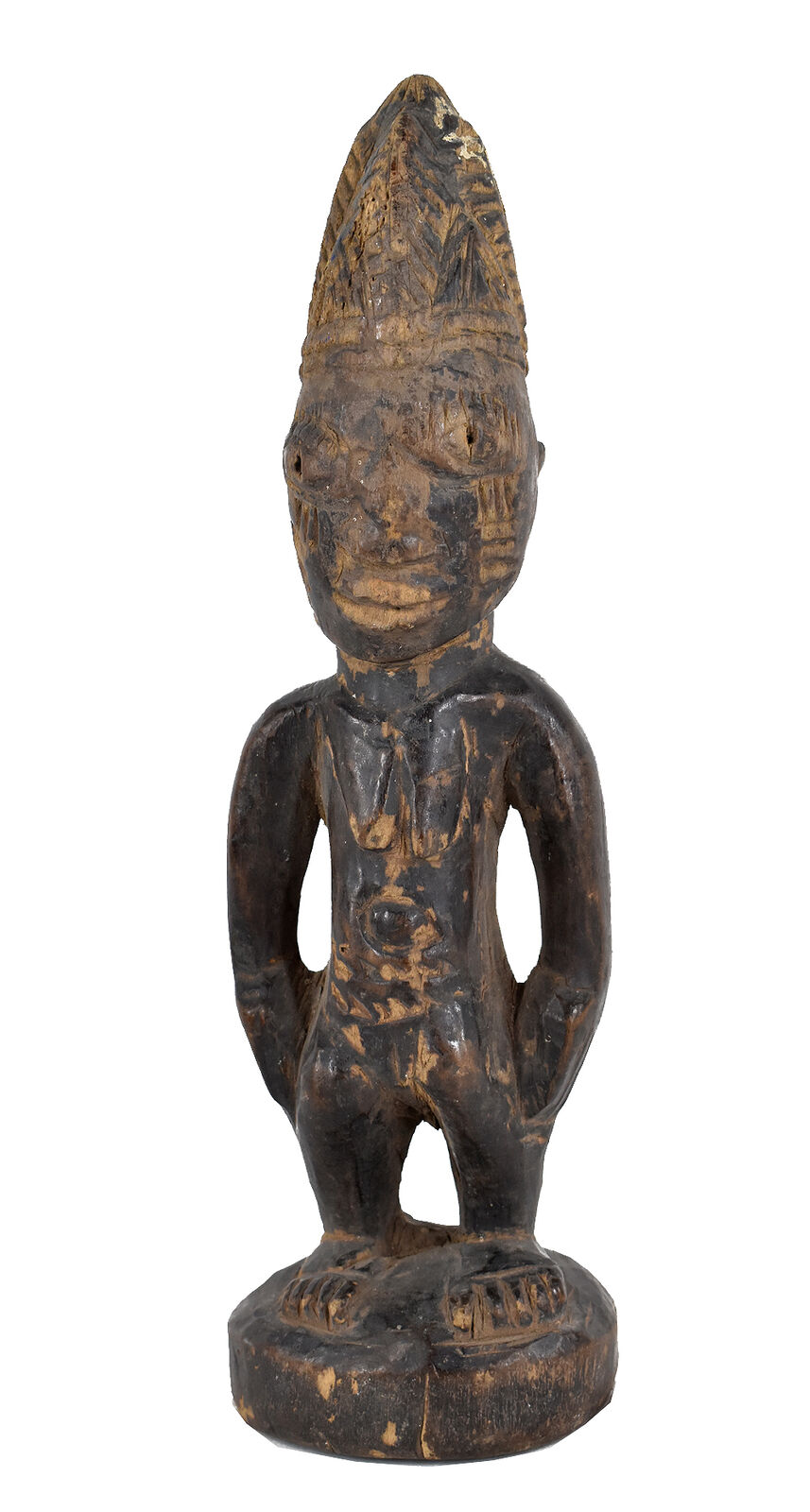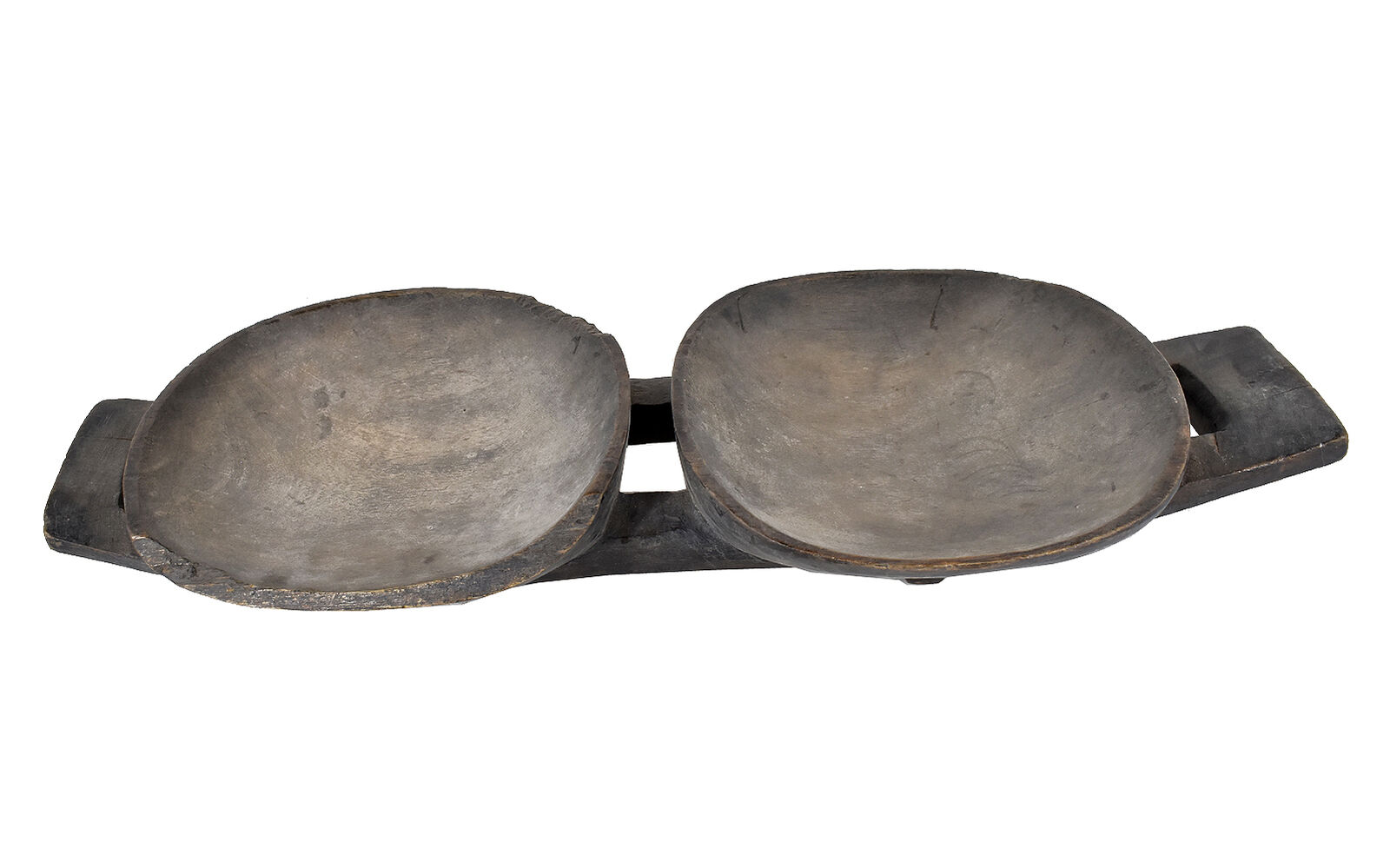-40%
Yoruba Ibeji Twin Figure Wood Nigeria African Art
$ 79.2
- Description
- Size Guide
Description
Type of ObjectCarved sculpture
Country of Origin
Nigeria
People
Yoruba
Materials
Wood, pigment
Approximate Age
20th century
Overall Condition
Good. Most of our pieces have spent decades on at least two continents, and have been treasured by several owners. Small splits, scrapes and cracks are a normal part of their patina attesting to their age and extensive use. We examine each piece carefully when we receive it and report any damage we find in our listings. Please look carefully at the pictures which may also reveal condition and damage.
Damage/Repair
Very worn surface
Additional Information:
The Yoruba of Nigeria and of the Benin Republic are known for having an extraordinarily high rate of multiple births. The rate of twin births is one of the highest in the world, 45 of every 1,000 births (in the United States it is 28.9 of every 1000). There is also a high mortality rate; half of the twins die shortly after birth.
In earlier times, new-born twins, or ibeji, as they are called, were believed to be evil, monstrous abnormalities and infanticide was a common practice. However, such beliefs and practices were later superseded and reversed, and by the middle of the 18th century twins came to be seen as a blessing; they were awarded the status of minor deities, called Orishas, and their arrival was viewed as an omen of good fortune for the family. By the 19th century the cult of the Ere Ibeji was firmly established and continues to this day. The death of one or both twins is regarded as a great calamity for the family, one which requires immediate appeasement of the soul of the deceased child.
Though the cause of the high rate of twin births among Yoruba women has not been established, the cultural grieving process is well documented and may be observed in the carving of a figure known as Ere Ibeji, which both represents the lost child and serves as a ritual point of contact with the soul of the deceased. The carving of the Ere Ibeji is commissioned under the guidance of an Ifa diviner, a Babalowo, whom the parents consult in selecting the particular artist who will do the work. The sculpture itself represents a deceased infant, but is carved with features and attributes of an adult. The sculptural features of genitalia, pubic hair, wide hips, developed breasts, gender specific facial scarification and mature coiffures exude an erotic sexuality, uncommon for infants. As Dr. Moyo Okediji notes, the completed ibeji figure is carved as an adult, rather than as the deceased infant, in a mythological form that depicts the concentrated calm of a Yoruba artist.
When the carving of the Ere Ibeji is completed, the artist is given a feast and payment as determined by the Orishas. Once the figure is brought to the family dwelling, it is placed on a shrine dedicated to Elegba with the hope that the Orisha or soul, which was split in two parts when the twins were born, will now again reside in the figure that represents the dead twin. The sculpted figure is treated and cared for as if it were alive. It is rubbed in sacramental oil, washed, fed, clothed, sung to and prayed to. It is kept standing during the day, and is laid down at night. Often it will be dressed in the same clothing as the living twin, or be decorated in a beaded vest or shown with raised sandals, indicating possible royal connections. The responsibility of caring for the ibeji is borne by the mother and female family members of subsequent generations. The sculpture is expected to avert evil from the household, strengthen the manifestations of family love, stare down death, illuminate the pathway through the valley of immortality, and bring good fortune to all who treat it with respect and offer it tokens of affection. Conversely, bad fortune and curses may be engendered if the ibeji is ignored.
Recommended Reading:
YORUBA-THE ART OF LIFE-THE BENNETT_LUTHER COLLECTION, Dr. Daniel Mato, by permission.
IBEJI, by Chemeche, ISN'T S/HE A DOLL-PLAY AND RITUAL IN AFRICAN SCULPTURE/Cameron
**137874**
All content, including pictures, Copyright Africa Direct Inc., 2021
Add Us To Your Favorite Sellers!
Please visit our About Us page.
Africa Direct, Inc. has been selling on eBay since 1997 and has received more than 56,000 positive feedbacks. It is owned by Eliza and Sara, who began the company after spending a year wandering southern Africa in a camper van with their multi-racial family. They have been honored with eBay's Hall of Fame award, and by eBay Giving Works, through which they have raised more than 5,000 in charity auctions.
Customer Service
: We treasure our many long term customers, and will try to make you one of them! If you have problems, please tell us... we care!
Handling Time
: We ship daily except Sundays and holidays. Most orders go out the same day, and all go out within 48 hours.
Returns
: We want you to be happy with your purchase. You're welcome to return an item within 30 days in the same condition you received it--just let us know you're returning it. You may have either a credit or a refund for your purchase price, not including shipping both ways. If your original payment was made through PayPal, we'll refund you through PayPal; if you paid us directly with your credit card, we'll refund the credit card.
Combining Shipping
: You are welcome to wait to pay, and to combine multiple items for shipping. We ask that you keep each order to 10 days or 10 items, whichever comes first--then start another order.
When you're ready, just send us a list of item numbers or an invoice request and we'll send you an invoice. You can pay by Paypal or credit card.
U.S. Shipping
: Our staff take great care in packing our artwork, much of which is antique, irregularly-shaped, and fragile. The cost of labor and the special packing materials used is reflected in our shipping price. Our U.S. shipping charges also include insurance; we self-insure on smaller orders. For these reasons, our shipping and handling charges may be more than the price of postage. .
International Shipping
: We ship dozens of international orders each week, to customers on every continent except Antarctica! The shipping charges included in our listings are for U.S. orders. Contact us for shipping charges to your country. We offer uninsured USPS First Class airmail, insured Priority airmail, and insured Express airmail to most parts of the world, depending on the weight, volume, and value of an item. We also ship via FedEx or DHL on request.
Import duties, taxes, and charges are NOT INCLUDED in the item price or shipping charges. These charges are the buyer's responsibility. Please check with your country's customs office to determine what these additional costs will be prior to bidding / buying. These charges are normally collected by the delivering freight (shipping) company or when you pick the item up -- do not confuse them for additional shipping charges. And please do not ask us to mark merchandise values below the actual value or mark items as "gifts"--U.S. and International government regulations prohibit such behavior.
Newsletter, previews and special offers
: Sign up for our newsletter
Go to Africa Direct Store












